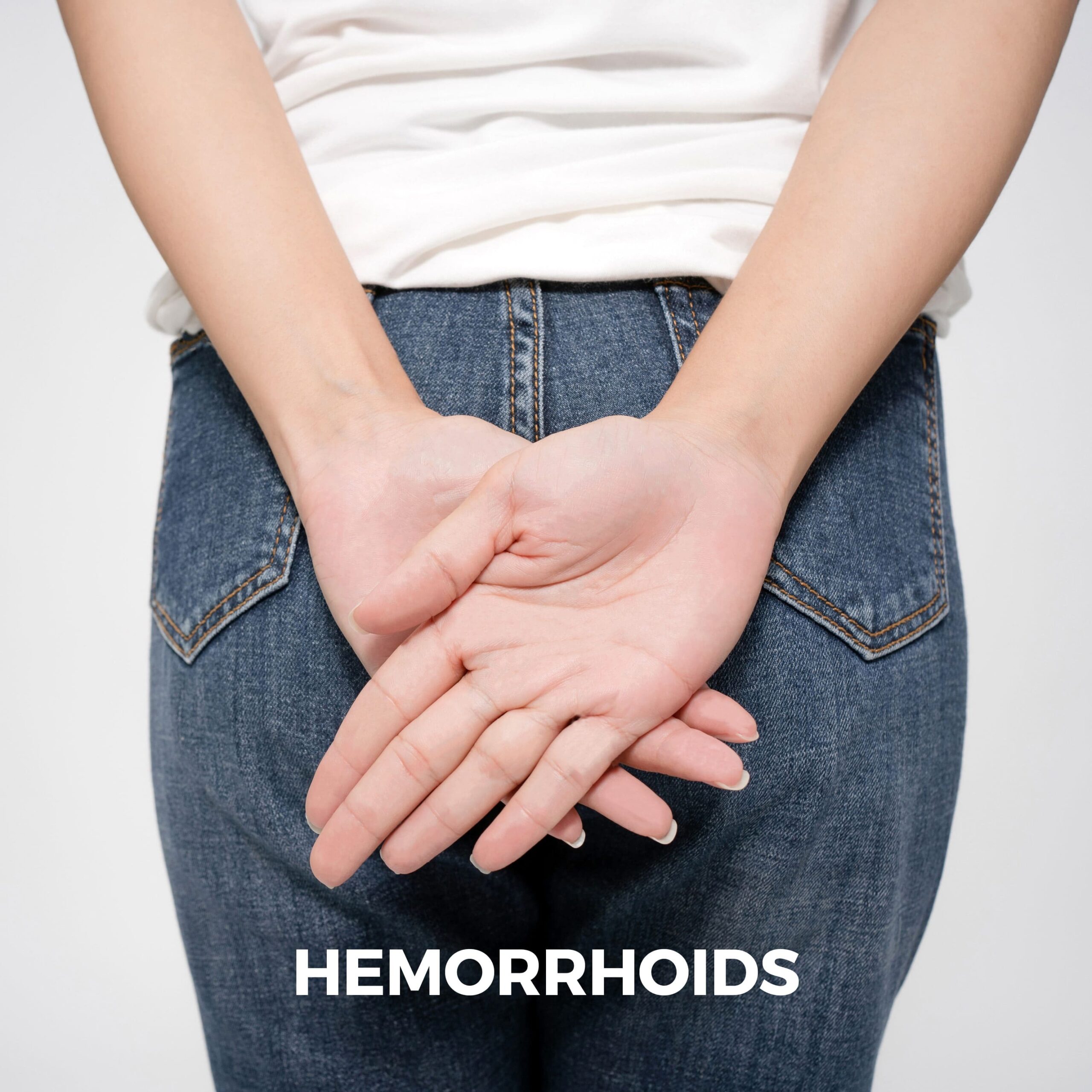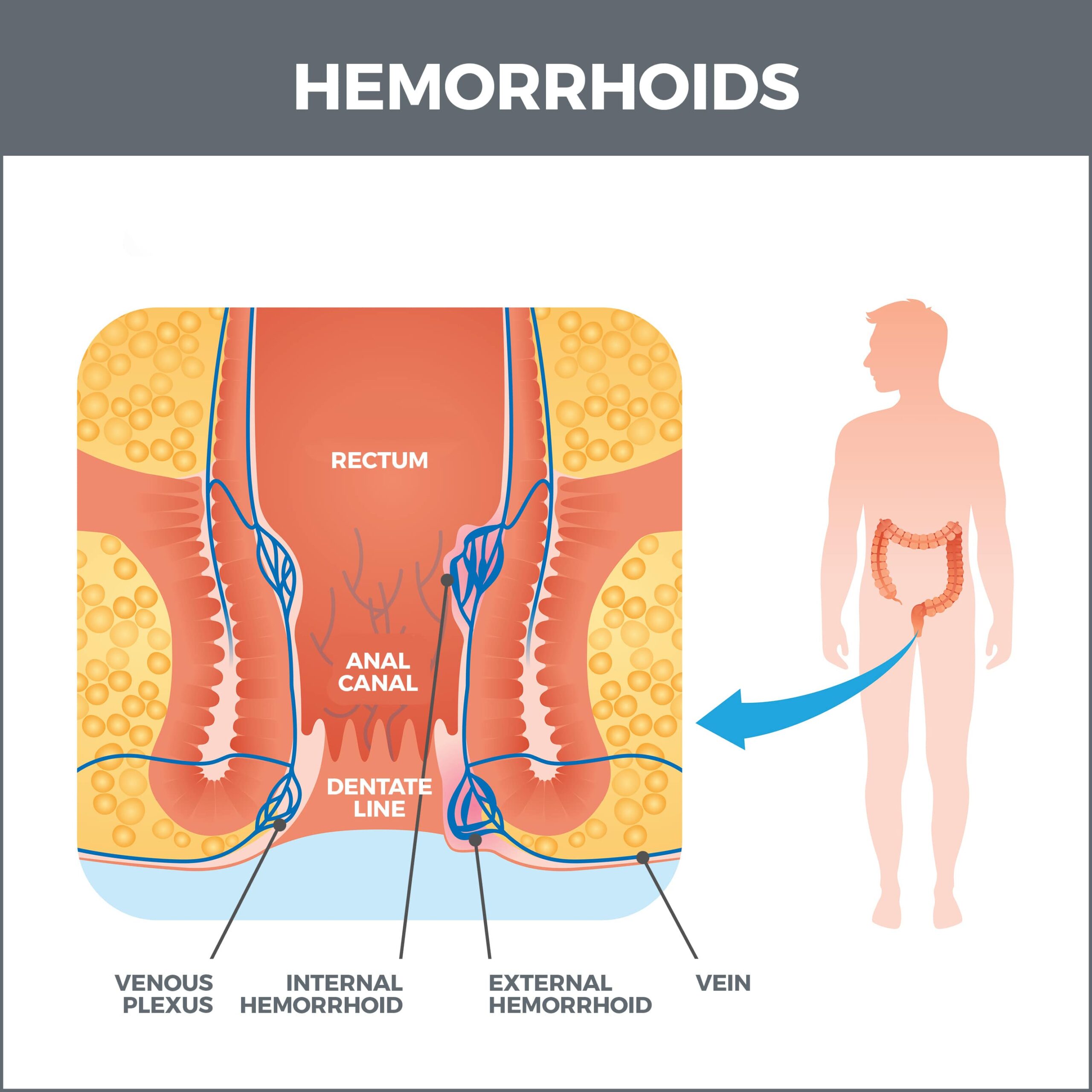
Hemorrhoids
If you have rectal pain, bleeding, or intense itching, you most likely have hemorrhoids. Hemorrhoids, or piles, are a common condition that affects one in 20 adults and afflicts half the population by age 50. All genders, ages, and races are susceptible to hemorrhoids. Although they aren’t dangerous, hemorrhoids can be a recurring disorder that interferes with day-to-day life.
What Are Hemorrhoids?
Hemorrhoids are swollen and inflamed blood vessels in the lower rectum and anus, similar to varicose veins. Although they can cause irritation and discomfort, they may also be undetectable and have no symptoms. Hemorrhoids are one of the most prevalent causes of rectal bleeding.
What Causes Hemorrhoids?
Hemorrhoids are typically caused by excessive pressure on your anal or rectal blood vessels. This causes bulging and inflammation. Pressure can be triggered by:
- Straining to pass bowel movements.
- Straining to lift weights or heavy objects.
- Staying too long on the toilet – could cause stretching.
- Pregnancy – As the uterus grows, it presses on rectal veins.
- Straining during childbirth.
- Excess weight.
- A low-fiber diet.
- Dehydration.
- Anal sex.
- Standing or sitting for long periods.
- Constipation.
- Diarrhea.

There are three types of hemorrhoids. You can have any of them at the same time.
Internal Hemorrhoids
Internal hemorrhoids are located far inside the rectum where you can’t see them. Typically, you can’t feel them either because that part of the rectum has no nerves that detect pain. The only clue is often bright red blood on your toilet paper or in the toilet.
There are four grades of internal hemorrhoids:
- Grade 1 – A Grade 1 hemorrhoid that doesn’t prolapse.
- Grade 2 – A Grade 2 hemorrhoid is a prolapsed hemorrhoid that withdraws back into the anal canal on its own.
- Grade 3 – A Grade 3 hemorrhoid protrudes from the rectum but can be manually pushed back in.
- Grade 4 – A Grade 4 hemorrhoid hurts too much to be pushed back in.
Prolapsed Hemorrhoids
A prolapsed hemorrhoid is a protruding internal hemorrhoid. It may have symptoms or none at all.
External Hemorrhoids
As the name suggests, external hemorrhoids are visible lumps under and around your anus. Since this area contains sensitive nerves, external hemorrhoids are often painful and can burn, itch, or swell. They’re particularly uncomfortable when you’re sitting or having a bowel movement.
Pain can increase if an external hemorrhoid develops a blood clot called a thrombosis. It can cause the area to turn purple or blue and form a rigid lump near your anus. The hemorrhoid isn’t dangerous, but the pain can be sudden and intense.
The clot usually resolves on its own, leaving behind a skin tag, a small flap of excess tissue.
If you suffer from hemorrhoids, there are preventative measures you can take to counteract them. These are easy options that you can incorporate into day-to-day life.
- Eat a Healthy, High-Fiber Diet: Hemorrhoid symptoms can be reduced or prevented by simply consuming more fiber. You can increase your fiber intake through supplements or foods such as whole grains, beans, broccoli, popcorn, apples, and nuts. Fiber is essential because it reduces fecal weight, decreases stool time in the colon, and improves water retention. Water softens and lubricates stools so that they can pass more smoothly.
- Stay Hydrated: Water is good for you in so many ways, and it also helps prevent constipation so that you don’t have to strain when you go to the bathroom. A good guideline is to drink eight eight-ounce glasses of water every day (the Eight x Eight Rule).
- Go to the Bathroom When You Feel the Urge: The longer you wait to go to the bathroom, the more your stool will harden and the more you’ll have to strain to pass it. Try to go as soon as nature calls.
- Stay Active: When you sit for long periods, it strains your rectum. Exercising can prevent this. It will also help you maintain a healthy weight that won’t overburden your lower rectum and anus.
Are Anal Fissures the Same as Hemorrhoids?
No. Although they both can cause pain, bleeding, and itching, they are different conditions. A hemorrhoid is caused by swollen veins, while an anal fissure is a tear in the anus’ lining. Anal fissures are usually caused by trying to pass large, dry, or hard bowel movements.
Can I Treat Hemorrhoids at Home?
Yes, several home remedies can make them more tolerable:
Aloe Vera: Sourced from the succulent aloe plant, aloe vera is an anti-inflammatory gel that soothes irritation. It is best only to treat hemorrhoids with pure aloe vera gel.
Sitz Bath: A “sitz bath,” which comes from the German word sitzen (“to sit”), is a treatment utilizing a warm, shallow bath that only covers the hips and buttocks. You can also buy sitz baths, which are plastic bowls that fit on top of your toilet seat.
Warm Epsom Salt Bath: Epsom salts are known for their pain-reducing properties. Add them to warm bathwater, and then sit in the tub for 20 minutes after each bowel movement.
Witch Hazel: Witch hazel is an anti-inflammatory astringent that can relieve swelling, itching, and pain.
Wipes: Replace toilet paper, which can irritate the skin, with soothing wipes. Use after each bowel movement to keep you just as clean as toilet paper would. Make sure they don’t contain irritants such as dyes or perfume.
Stool Softeners: Stool softeners pull water into bowel movements, making them softer and easier to pass.
Suppositories, Creams, and Ointments: Various over-the-counter suppositories, creams, and ointments are available for hemorrhoid relief. Some shrink the rectal veins, while others contain a steroid that decreases inflammation. Some also include an anesthetic that curtails pain.
Cold Compresses: Cold compresses can be particularly effective for large, inflamed hemorrhoids. Wrap a towel, washcloth, or paper towel around ice (the ice shouldn’t directly touch the skin) and apply for approximately 15 minutes at a time.
Contact Us
Typically, hemorrhoids can be easily relieved with over-the-counter remedies, dietary improvements, and lifestyle changes. Sometimes hemorrhoids will clear up on their own. If these remedies haven’t been effective, our experts will discuss treatment options. These solutions can provide you with long-term relief and get you back to your daily life.
Contact us today. The team of professionals at GastroMD looks forward to working with you. We are one of the leading gastroenterology practices in the Tampa Bay area. We perform a host of diagnostic procedures using state-of-the-art equipment in a friendly, comfortable, and inviting atmosphere where patient care is always a top priority.



